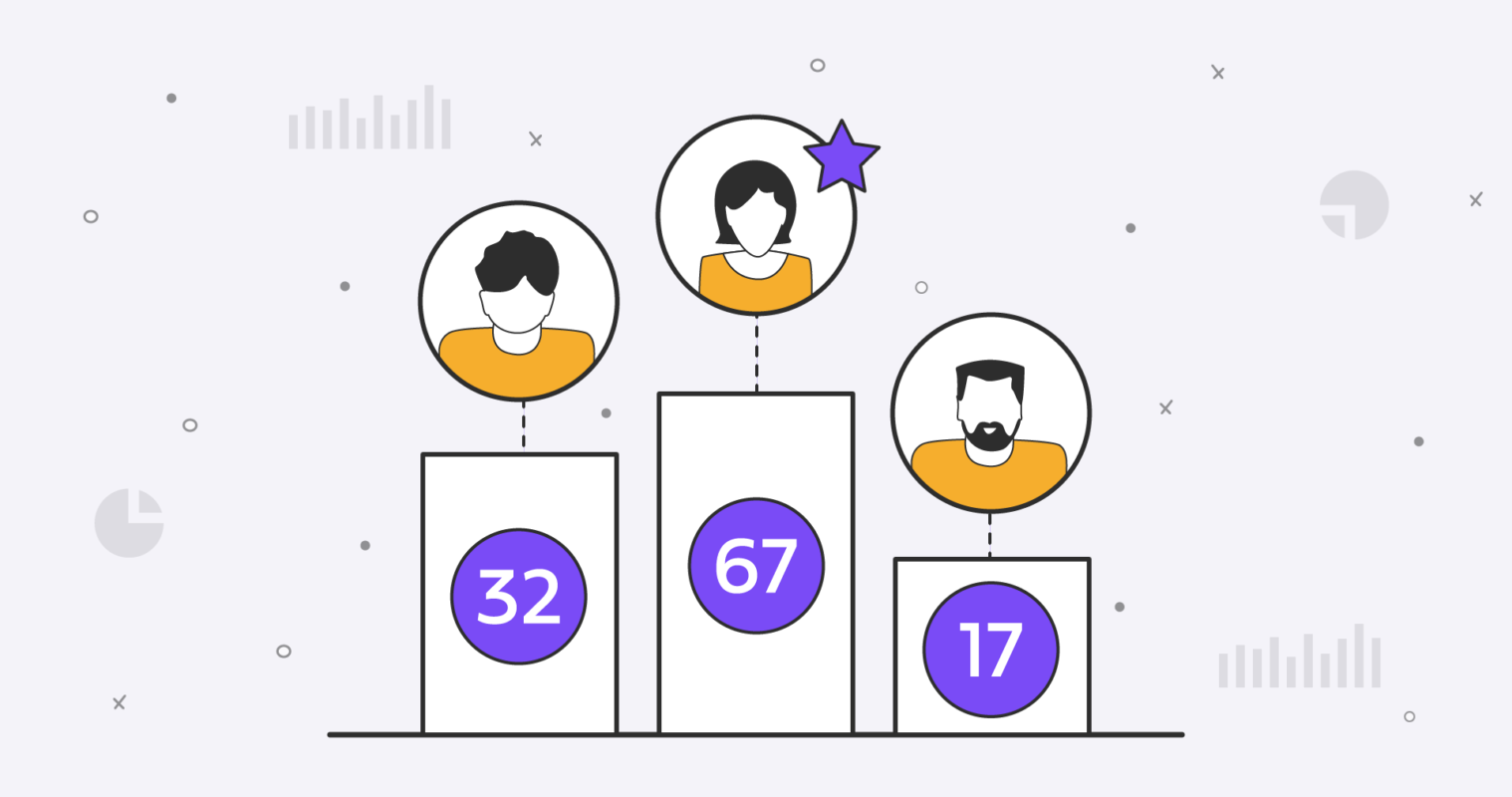Table of contents:
The lead scoring software market is expected to leap from US$ 1.7 Billion in 2022 to US$ 5.1 billion in 2032; an 11.6% growth spanning over the next ten years. This comes when more and more sales experts are embracing technology to help identify new opportunities and cut down costs, time, and resources wasted on uninterested customers. Marketing and sales teams are shifting focus to quality rather than quantity in their campaigns.
Lead scoring is a pivotal step in the B2B lead generation process, enabling organizations to measure performance and put metrics behind their selling efforts. It’s an essential way to oversee how ready your leads are to take the next step in the buying process. Eventually, lead scoring helps you measure the value of a lead to your business and how likely they are to buy from you.
If you’re new to the lead scoring process, stick around as we analyze what it means, how it’s done, and why it’s important for your business.
What is Lead Scoring?
Lead scoring is a way to assign a score or value to leads based on their likelihood of becoming a buying customer. Since lead generation campaigns often have a massive volume of leads streaming from multiple channels, it’s important to give the sales and marketing teams (and the software) as much information as possible to focus their efforts on leads most likely to convert.
Lead scoring helps companies identify which leads are qualified enough to take the next step in the sales process and which ones need additional nurturing. It also helps marketing teams tailor their lead generation activities, letting them know when they’re missing opportunities for selling to already interested customers. With lead scoring, you can optimize your lead generation campaigns by focusing more on selling to the people most likely to convert.
Lead Scoring Software vs Lead Management Software: Similarities & Differences
Before we step deeper into lead scoring, it is important to point out that lead scoring differs from lead management.
Lead Scoring & Lead Management Software Similarities
- Both lead management and scoring software help businesses streamline their sales processes and increase their ROI by ensuring leads are handled efficiently from initial contact to final sale.
- Lead generation and lead scoring software enable you to keep track of where each potential customer stands with regard to buying your product or service, as well as what kind of incentives might motivate them to buy sooner rather than later.
- Lead management and scoring are built-in features in your CRM tool.
- Lead scoring and lead management software rely on data input to help track where the customer lies in regard to buying your product or service. Such data includes demographic information, industry, engagement, and behaviour.
Lead Scoring & Lead Management Software Differences
- Lead management software is designed to help you organize your leads so that you can track their movement throughout the sales process.
Lead scoring software, on the other hand, is specifically designed to help you determine which leads are likely to become customers sooner rather than later. It analyzes your lead’s buying signals and engagement with your sales strategies.
- Lead management software focuses on organizing and tracking leads to keep deals well organized in the sales pipeline and identify opportunities.
On the other hand, lead scoring software helps businesses qualify prospective customers based on factors that indicate the likelihood of a sale.
Did you know? “By 2022 over 70% of B2B marketers are going to be using intent data as part of their marketing strategy”
Approaches to Lead Scoring that Every Salesperson Should Know
You can score leads using a variety of different approaches. Each scoring approach has its own set of benefits that can be very useful in different sales situations.
Here are some of the most common lead scoring approaches every salesperson should know:
- Explicit lead scoring – Explicit lead scoring measures the level of interest a prospect has in your business and your offerings by assigning a score range based on the lead’s own provided information. If you’re targeting other salespeople, your explicit lead scoring system will rank leads with a salesperson’s title higher than engineers. Additional data may include their demographics, needs, budget, experience, education level, location, and so on.
- Implicit lead scoring – This lead scoring process ranks suitable leads based on behaviour monitoring. The idea behind implicit lead scoring is to rank a lead’s action based on its value in the buying cycle. If you sell software products to B2B marketers, a prospect who filled out your form will be ranked higher than a marketer who only visited your blog. Other key pointers include subscriptions, requesting demos, subscribing to your email list, and so on.
- Predictive lead scoring – Predictive lead scoring analyzes past data with AI, machine learning, and algorithms to predict the likelihood of a lead becoming a customer. Predictive lead scoring relies primarily on historical data and statistical predictive modeling to identify cold, warm, and hot leads. The data used in this lead scoring model includes past buying behavior from sales CRM, customer engagement, demographic data, customer account profile data, and so on.
- Rule-based lead scoring – As the name implies, rule-based lead scoring is used to score leads based on your desired characteristics and behaviors. This is different than using a standard lead scoring system with a set of pre-defined rules to determine which leads are more or less valuable. For instance, a lead belonging to the target age gets positive lead scores, while those outside the target age gap get negative lead scores
Why Do You Need Lead Scoring in Your Business?
Lead scoring allows you to prioritize the leads you spend your time and effort on and identify which leads are ready to move forward in the sales cycle.
Here’s why it’s so important in your business:
- Lead scoring enables you to sort and prioritize leads. When a new lead streams into your sales CRM, the scoring system helps you sort out high and low-priority leads. Channel your sales efforts to high-priority leads and spend more time nurturing the low-priority ones.
- You’ll see which lead activities bring you the most value. With a lead-scoring process in place, you’ll see which lead-generation activities bring you the most value. For instance, if you attract more high-priority customers through your website, you may want to spend more time creating high-quality content and developing compelling calls to action in your product pages.
- Lead scoring helps you stop wasting time and money on low-quality leads. Without a lead scoring system, identifying high and low-quality leads gets harder than it should be. This means you may be spending time and money with low-quality leads and ignoring high-quality ones. A lead scoring system will clear this up for you, so that you can channel resources to ready customers and spend more time nurturing low-quality leads or abandon them altogether.
- Lead scoring will help you estimate returns on different lead-generation activities. We’ve already talked about how a lead scoring system will allow you to sort and prioritize leads based on their quality. Lead scoring systems provide insights into the approximate value of “hot” leads that are more likely to buy from you. Subtract your paid lead generation activities from this estimate, and what you’ll get is an estimate of whether your lead gen activities are bringing you a return on your investment.
Last but not least, lead scoring allows you to understand your sales process as a whole so you can tailor your marketing efforts to acquire higher-quality prospects for your business.
How to Automate Your Lead Scoring via CRM
Earlier on, we mentioned that lead scoring is often a feature in most CRM tools. Most sales CRM tools like Pipedrive provide lead scoring, not as part of the native features but as an add-on. Depending on your needs, it’s easy to get lost in the myriad of lead-scoring add-ons available on the Pipedrive Marketplace or other third-party lead-scoring integrations.
That’s where we come in. Automaly experts will review your business and your current Pipedrive CRM setup, identify your lead scoring needs, and recommend the most suitable integrations to meet those needs. We are a certified Pipedrive Premier Partner enabling small businesses to get the most out of their sales automation software.
Our experts are savvy business growth, marketing, and sales teams, so you can be sure you’re in the right hands.
Ready to set up your lead scoring system in your Pipedrive account? Book a free Process Health Check or get in touch with us and let us know how we can help!
Conclusion
Lead scoring enables you to understand how ready your leads are to take the next step in the buying process. Lead scoring tools are essential for sales teams, especially in B2B environments where leads come from multiple channels. These systems enable you to assign lead scores to each lead, prioritize the best leads, and eventually improve your sales process.

